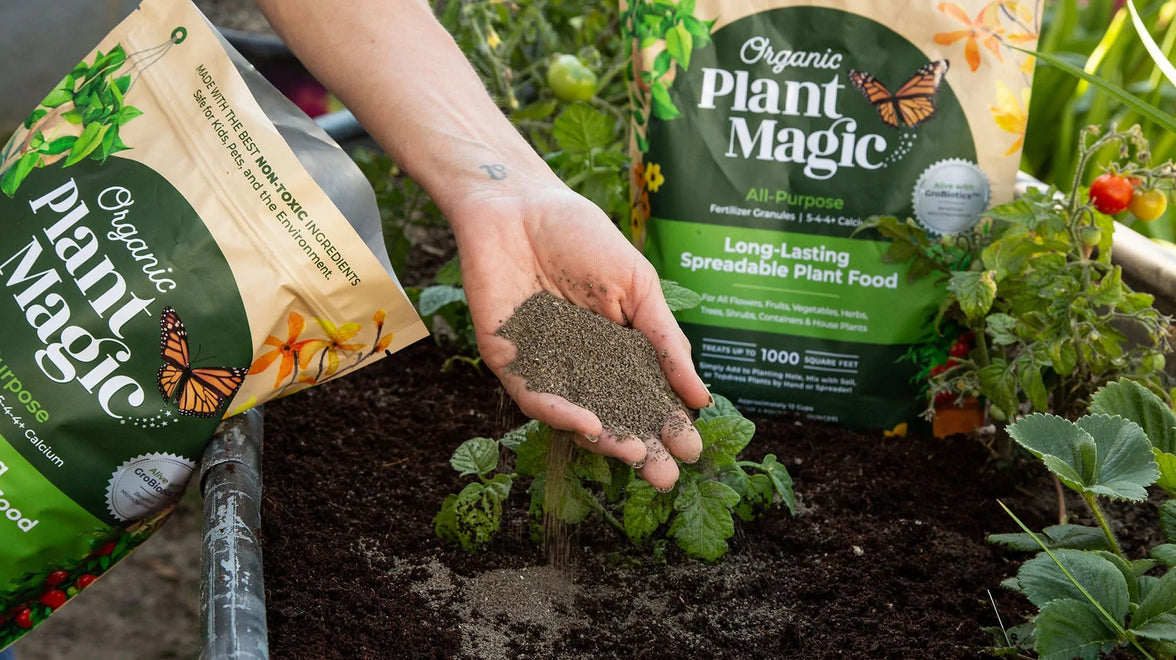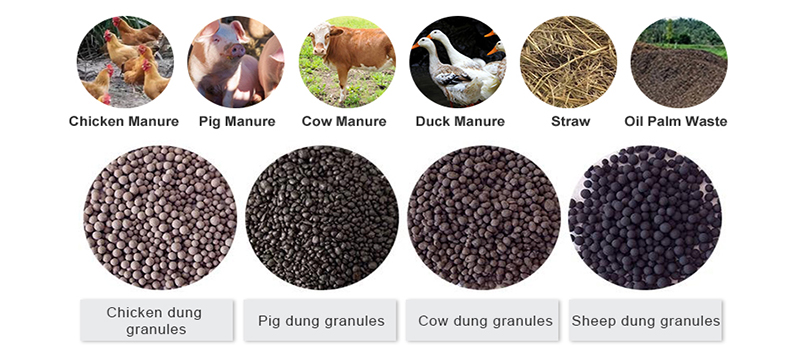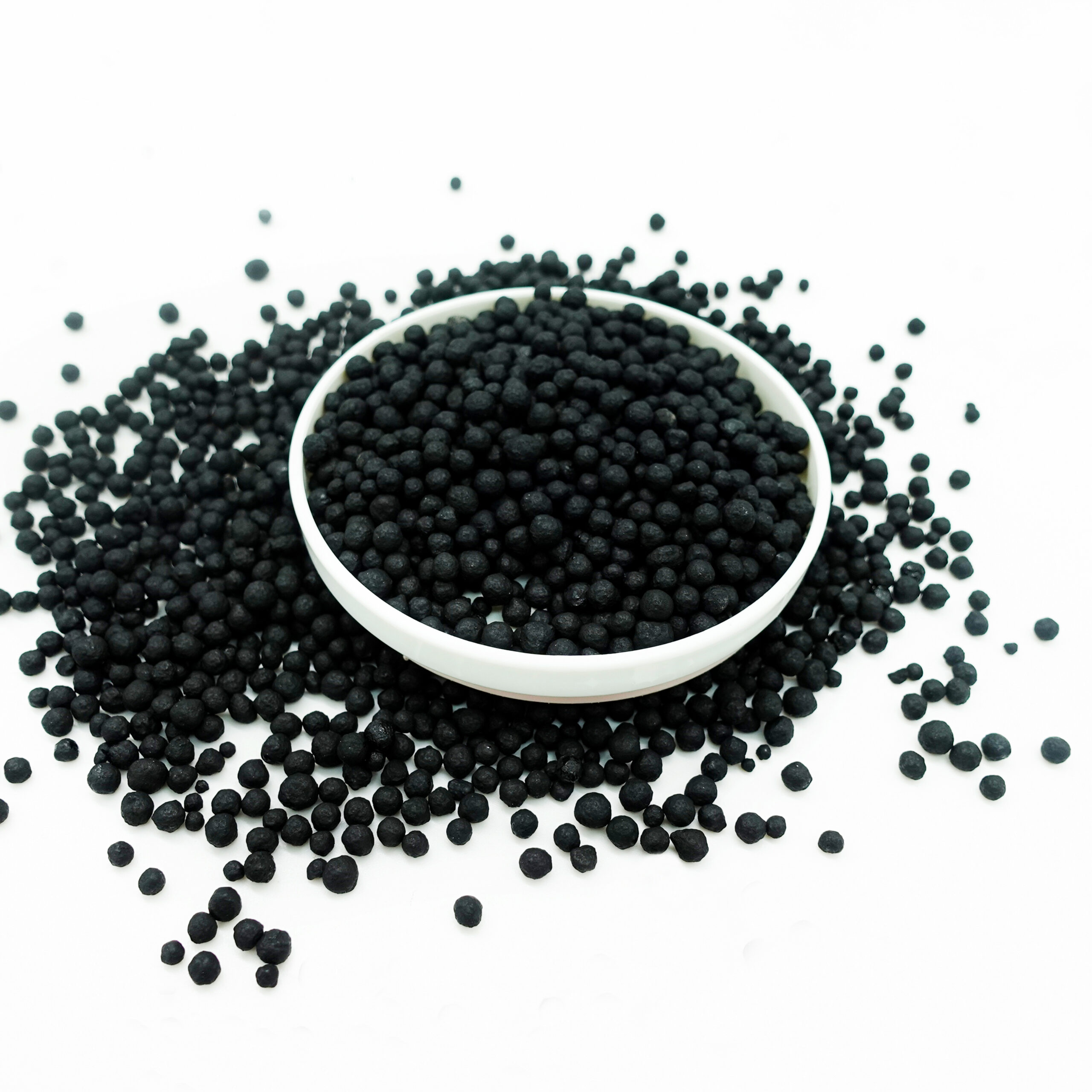Introduction to Organic Fertilizer Granules
The rapid development of organic fertilizer granules are driving us to a new trend of green gardening and putting our gardens into the general ecological circle of nature.
Organic fertilizer granules are a type of new organic fertilizers. It is precisely processed from traditional organic fertilizer by certain equipments to produce small and tough particles. When comparing with traditional organic fertilizers, classification granulation can make the application of fertilizers more save and controllable. Different from the liquid granules and powder, granules can be digested by plants in a slow way, making nutrients avoiding from being easily exposed to the outside world, feeding the plants in a long way and thus contributing fertilizer more efficiently to plants and protecting the healthy of the soil more effectively.
The trend that can be noticed for some time is moving towards organic fertilizer granules for gardening purposes. The main reason for giving it preference to conventional fertilizer forms is because of variety of benefits it bears over traditional options.
Reducing the risk of fertilizer excess gosever is a benefit that comes with using organic granules. As it does not decompose immediately, plants will receive a constant fresh supply of nutrients only when neededa. As Dr Sarah Green from the Ontario-based University of Sustainable Farming explains: “Organic granules guarantee the controlled release of nutrients thus minimising leaching and further runoff. This makes them one of the most essential elements for eco-friendly agricultureaimed.” The ecological impact is greatly decreased as this method of gardening focuses on the plants taking the nutrition they actually require in optimum quality.
Such switch to granular organic fertilizer not only makes the logistics of gardening much simpler and more manageable, but also attracts amateur gardeners and professional landscapers alike with their ease of handling and storage, the lack of dust in the air, and the instant incorporation into soil. Once the organic fertilizer granules are worked into the routine of gardening by the masses, wouldn’t today’s children be growing up with a cleaner earth, with healthier plants and a more resilient ecosystem? This opening passage prepares the reader for the main body which examines the differences among various types of granules and the specific ways in which gardens and the planet as a whole benefit.
Types and Benefits of Organic Fertilizer Granules
There are many kinds of organic fertilizer granules in the market for different gardeners with various purposes. Some will help plants to grow stronger, while some will make the soil healthier. Let’s find out.
Compost Pellets: Compost pellets are a type of organic fertilizer granules that are made of decomposed organic matter. This fertilizer helps enrich the soil with several necessary organic nutrients and alters the soil’s structure. When used as organic granules, compost pellets increase the soil’s water retention capacity and aid in introducing beneficial microorganisms that facilitate nutrient breakdown and absorption.
Bone Meal Granules: These granules add phosphorus and calcium to the soil, which nourishes root development and bloom formation. Bone meal makes it easy for flowering plants and fruit-bearing shrubs to provide a strong foundation for growth and reproduction.
Seaweed Extract Granules: Rich in micronutrients and growth hormones called cytokinins and auxins, which speed up plant growth and stress resistance. This fertilizer supports plants when they are stressed by drought or pest infiltrations. It helps plants become stronger.
Benefits of Organic Fertilizer Granules:
- Improved Soil Health: Organic granules improve long-term soil fertility by increasing soil structure (aggregate formation), aeration, and the maintenance of beneficial soil organisms. “Organic granules help support a living soil ecosystem, where there is a host of beneficial soil biota performing multiple ecosystem services for agriculture,” says Emily Stone, PhD, soil health specialist.
- Improved Water Retention: Granules improve the fibrous nature of the soil, which keeps it healthy and moist, especially during dry weather, which is bad for the health of plants. Obviously, this property of granules helps lower the frequency of watering, thus saving water – an important aspect for eco-gardening.
- Slow-Release Nutrients: Yet another significant characteristic of organic granules is slow-flush release; a mechanism that makes nutrients available to plants over a period of time; thus, helping plants to grow to their fullest potential as well as reducing the quantity of nutrients flushed into adjacent water bodies, thereby helping to minimize environmental pollution.
By selecting the type of organic fertilizer granule best suited to their needs, gardeners can create the ideal growing conditions for their plants, while adhering to the principles of sustainable gardening. Bone meal is a clay subdivision designed for stimulating flower production, while seaweed extracts are used to improve the general resilience of plants.

How Organic Fertilizer Granules Contribute to Eco-Friendly Gardening
The organic fertilizer granule is widely applied to encourage eco-gardening. It can be put in various garden management to make people develop their ecological gardening from plant growth reaching high productivity and healthy soil to decrease the earth destruction.
Reducing Environmental Impact:
- Reduced Runoff: Slow release is among the biggest benefits of organic granules. You don’t have to worry that the fertilizer won’t remain where it’s intended. You can count on the majority of nutrients in the granules to make their way into the soil as your plant slowly consumes them. This slow release works in your favor during rainstorms, too. There’s a much lower risk of nutrient runoff when using natural versus synthetic fertilizers. In fact, fertilizer runoff is a major cause of eutrophication in lakes and other stretches of water.
- Reduced Greenhouse Gas Emissions: Organic granules typically have balanced nutrient contents, producing less nitrous oxide than synthetic formulations, which tend to be high in nitrogen. Organic fertilizers are also often manufactured with lower carbon footprints than synthetic fertilizers.
Supporting Biodiversity:
- Stimulating Organic Matter: Through the supply of a broad range of natural ingredients, the organic granule also stimulates the activity of microorganisms essential for soil health, such as beneficial bacteria and fungi. These microorganisms are essential in all nutrient-cycling processes for healthy plant growth and development, and reduce incidence of plant disease.
- Beneficial Insects Attracted: Beneficial insects such as pollinators (bees and butterflies) and natural pest predators can be attracted to your garden when plants grown without chemical fertilizers or pesticides are more diverse and healthy. As a result, there is a reduced need for chemically sprayed pesticides. That’s how your garden farms naturally.
Benefits to Soil and Plant Health:
- Enhance Soil Structure: Organic granules help increase soil structure. This increases aeration, allows more infiltration of water, and increases the capacity of the soil to retain nutrients. Stronger plant roots lead to more drought and erosion resistance.
- Nutrient Efficiency: Natural nutrients in organic granules are from sources that are more closely matched to plant uptake, resulting in greater efficiency, healthier growth, and more robust yields.
Advocacy from Experts:
- Helen Stone, specializing in agriculture sustainability, supports the spreading of organic granules in gardens and farms: “Using organic fertilizer granules is a way to feed a plant, but it actually supports a whole ecosystem; usage of organic fertilizer granules can be a major step towards developing agriculture methods that are more sustainable, using less chemicals and support natural bio-systems.”
Organic fertilizer granules can bring more fruitfulness to planting. Gardening with organic fertilizer granules encourages a communion between an enthusiastic gardener and nature. On the one hand, we want a flourishing, abundant garden. On the other hand, we are concerned about our planet. These two goals are not mutually exclusive. The use of organic fertilizer granules provides an easy way to bridge between gardening and environmental health. This should be regarded as a value-neutral statement. I have been doing quite a lot of gardening recently.
Application Techniques for Organic Fertilizer Granules
Once again, knowing how to use organic fertilizer granules is important, and it ensures that your garden gets the most out of the granules. Here’s a guide to using the organic fertilizer properly in different kinds of gardens.
Preparation for Application:
- Timing: The optimal time for applying organic fertilizer in the form of granules is early in the season for spring growth and again toward the onset of the fruiting peak. Here they will be available in the soil for the plants when they actually need them.
- Weather Treatment: Scatter your granules on a calm dry day. Keep granules dry and out of access of the rain or wind so they do not get washed or blown away.
Method of Application:
- For Vegetable Gardens and Flower Beds:
- Weigh out the correct amount of granules, according to what the container says to use or what a soil test you’ve done advises.
- Scatter the tiny granules around the base of your plants, or on rows about six inches from the stems, so they don’t touch – which could result in a burn.
- Use a rake or hoe to gently mix the granules into the top 1-2 inches of soil, hastening granule activation, and keeping the granules from being picked up by birds or insects.
- Now, water it in well, so that the granules can start breaking down and feeding your plants.
- For Lawns:
- Use a broadcast spreader to ensure even coverage over large areas.
- When the spreader is set to the correct application rate, the product will be evenly spread and there won’t be too much or too little of it.
- After spreading, water in to rinse the granules and start the nutrient release process.
Dosage and Frequency:
- Dosage: Follow the application rate noted on the fertilizer label, which is usually based on the size of the area that you are fertilizing (e.g., grams per square meter).
- Frequency: Generally once every 4-6 weeks, during the growing season – depending on the crop’s nutrient requirements and the product’s nutrient release rate.
Special Tips:
- For Pot Plants and Containers: Use sparingly as containers can quickly become over-fertilized. Use only half the recommended application for in-ground applications, except where products specify otherwise.
- Check Plant Response: After application, watch your plants closely to observe responsiveness, or for symptoms of excess or deficiency, and adjust your practices accordingly to keep your plants healthy and productive.
So, when using organic fertilizer granules, follow the steps above, and you will unleash the strengths of your plants and see bigger gardens with healthy organs. This way you can fertilize and give your plants what they need before season, so they can blossom with pride and healthy gorgeous colors.

Challenges and Solutions in Using Organic Fertilizer Granules
So while on the one hand, organic fertilizer granules are great products that bring many advantages to sustainable gardening, there are also some disadvantages to contend with, and gardeners should always be aware of their potential and how to deal with them.
Common Issues and Solutions:
Uneven Nutrient Distribution:
- Write: Sometimes, use of granular fertilizer leads to unusual growth, for example if the fertilizer is unevenly applied.
- Solution: Once applied, use a spreader to spread fertilizer on large areas of lawn and be careful to measure how much you use; you can also regularly turn the soil around plants to help disperse nutrients more evenly.
Timing of Nutrient Release:
- Challenge: Sometimes organic granules release nutrients too slowly, which means plants get only occasional bursts of nutrients, leading to sporadic deficiencies.
- Solution: Adding a liquid organic fertilizer can deliver nutrients when plants exhibit symptoms of deficiency. Another solution would be to understand the release rates of your preferred granular fertilizer and to time applications so they precede times of high growth.
Cost Efficiency:
- Counterpoint: Despite the environmental challenges, organic granules are frequently more expensive than their synthetic competitors.
- Solution: Over the long run, the natural fertilizer will be more effective, reducing costs through its positive effects on soil health, better rain retention, and lower use of pesticides. Buy the bags in bulk and opt for natural plant-based fertilizers made locally.
Storage and Handling:
- Complication: Organic granules are sensitive to damage by moisture from the air, which makes them clump or degrade if not stored in a specific manner.
- Solution: Granular fertilizers store safely in a cool, dry place, in air-tight containers. Store in buildings with reduced moisture such as silica gel packets.
Expert Advice:
- Dr Lucy Wang, an expert in organic agricultural practices, advises: ‘With organic granules you should rely on regular soil testing, and be responsive to salt-related garden-pond issues. Overall, when organic fertilizers are used in a timely fashion and responsively, in line with soil test results and plant types, the impact on garden ponds should not outweigh the many positive benefits of organic fertilization.’
If gardeners carefully consider these challenges and employ suitable counter-measures, organic fertilizer granules should provide the right balance of advantages and disadvantages. Therefore, such gardens will become ecofriendly, as they can serve people with their products.
Conclusion
In conclusion, organiv fertilisare granule are an evident step forward. Organical granules tend to make the eco-friendly gardens more healthfull and more productive. Besides, nowadays gardeners are the protectors of environment. They care not for their own needs only, but also for the green world around. Choosing organic granules is much more than a straightforward action for a plant’s growth. It means to help the local area becoming more sustainable for all creatures.
In conclusion, as demand for efficacious and ecologically friendly fertilizer for gardening purposes is going to rise worldwide, the importance of organic fertilizer granule will be undoubted, innovations and researches in organic fertilizer are expected to bring better products to people with higher efficacy and convenience.
The utilisation of organic fertilizer granules would not only cultivate the garden but would cultivate the planet by simultaneously increasing the fertility of their plants and maintaining the environment. Organic granules are a good option for a green thumb who wants to make some real positive effective in the future of the environment.
By and large, we found that organic fertilizer granule is a good helper for gardeners to cultivate nourishing gardens, fruitful lands, which are both good for our senses and benevolent to the environment. We are advocates of practicing environmental protection along with our minor gardening.
Here are some valuable resources about organic fertilizer granules :
- Physical Properties of Granular Fertilizers and Impact on Spreading: This source from Ohio State University outlines the crucial aspects of granular fertilizer’s physical properties such as bulk density and particle shape, which are significant for the proper spreading and effectiveness of the fertilizer. Understanding these properties can help you optimize the application and ensure even distribution.
- Pros and Cons of Granular and Liquid Fertilizers: Michigan State University Extension discusses the differences between granular and liquid fertilizers in terms of nutrient delivery, cost, and application methods. This information can help you decide which type of fertilizer might be best suited for your gardening needs based on efficiency and economic factors.
- Guide to Understanding Fertilizers: The Oregon State University Extension provides insights into choosing between organic and commercial fertilizers, highlighting how organic products are beneficial for building good soil and feeding the soil food web. This guide is useful for understanding the broader impacts of your choice of fertilizer on soil health and plant nutrition.







